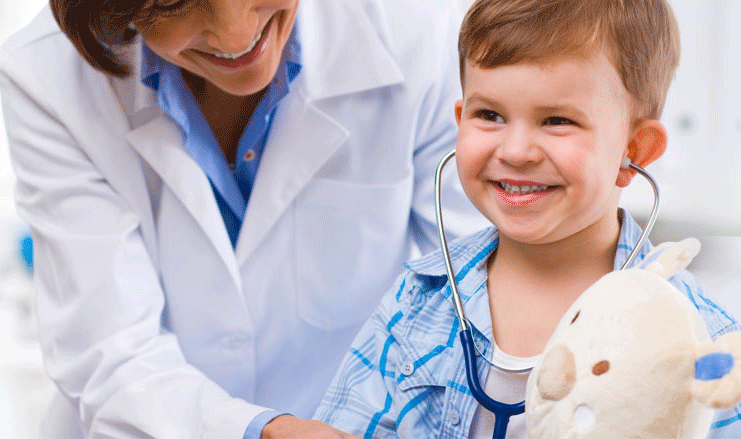Newborn’s Manual
Welcome to Plaza Family Care! Thank you for trusting us with your children.

In 1973 we established Plaza Family Care with a commitment to safeguard the health and wellbeing of our patients, our communities, and our environment. We strive to honor that commitment every day.
Our pediatricians are all graduates of American schools and have completed their post-graduate training at some of the most prestigious hospitals in the country. They are Board Certified and have held teaching positions at major medical schools in the tri-state area.
We have modern offices in Chester and Hackettstown. The Pediatricians are “in” 365 days a year (including evenings, weekends, and holidays) and are available by phone 24 hours a day.
We have an extensive adult medical division and are happy to take care of your entire family. Our Board Certified Internists and Gastroenterologist see patients from late adolescence through old age.
Patients customarily transit from Pediatrics to Internal Medicine at age 18 but some teenagers want to see an “adult” doctor at an earlier age and some want to stay with their Pediatrician until they are older. We are flexible and try to accommodate individual choices. Patients with special needs or diagnoses often remain under Pediatric or “shared” care for a longer time.
Some Other Things You Should Know About Us That Might/Not Make Much Difference to You… Right at This Minute.

Plaza Family Care has been around for over 40 years. Nearly a third of our current newborns are second or even third generation patients. We might well have been your mother’s Pediatricians, but we are not “your mother’s Pediatricians.”
We are a “green practice”. Our offices are as environmentally friendly as the buildings and economics allow. Our newsletter articles on raising a “green baby” are available at our website www.pfcmd.com and have been published by NJ Family magazine.
We know that doctors prescribe much more medication than our patients ever use. Those excess or out-dated drugs are a threat to our toddlers, our teenagers, and our environment. Unintentional poisoning is the nation’s second leading cause of injury and death; prescription drugs cause four times as many deaths than in the United States as heroin and cocaine. Flushing drugs down a sink or toilet, or putting them in the trash doesn’t destroy them, it just pollutes our soil and drinking water.
We have a take-back program for excess medications. Just bring them to us during regular office hours and we will destroy them. Our patented Smart Sink™ technology renders them unusable, unrecoverable, and non-polluting. This is a community service; there is no charge and you don’t even need to be our patient to take advantage of it. As far as we know we are the first and only practice in the world offering this service.
We can take pills, liquids or patches. Please bring solid medicines in a plain paper or plastic bag; we do not want pill containers, labels, or packaging material. At this time we cannot accept injectibles, chemotherapy, narcotics, or samples from other medical offices or clinics.
We have an over-arching dedication to keeping you and your family well. We are skilled at treating illnesses, but we would much rather keep you healthy. Existentially, that means we want to keep you and your children from becoming victims of the national obesity epidemic. To support that objective we routinely monitor BMI (Body Mass Index) and have established a dynamic nutrition program. Our on-site nutritionist works closely with the Pediatricians and Internists to help you and your children stay healthy and fit.
Whenever your insurance allows, we test vision in infants and children using the Diopsys® computerized system. This lets us diagnose vision impairment long before it would be detected by traditional clinical examination.
We do not think children should be senselessly exposed to weapons, drugs, media violence, bullying, or discrimination. Our commitment to their health and well being would be a hollow promise if we didn’t do everything we could to protect them while they are growing up. STAND UP FOR CHILDREN is the tax exempt, charitable foundation we established and fund to help accomplish that. You will see evidence of it throughout the practice. You can click on it at www.pfcmd.com for info.
Congratulations on the birth of your baby!

We hope you have had a successful pregnancy and a safe delivery of a healthy child.
If there have been any problems we, and a team of sub-specialists, are ready to do all we can to help.
We jokingly refer to this pamphlet as your, “Owner’s Manual” and suggest you read it before operating your baby. We wish there really was such a thing, but it doesn’t exist; there are just too many different models for a single manual.
We jokingly refer to this pamphlet as your, “Owner’s Manual.” We wish there was such a thing, but it doesn’t exist; there are just too manydifferent models.
Pick your baby up, hug him, tickle him, and get to know him. If this is your first child, welcome to parenthood. Don’t expect to feel very confident right away, (you are really in your fourth trimester.) With patience and common sense you will be able to adapt to your new role.
BABY NEEDS
Your baby needs you, not everything featured at Babies R Us or The Bump. Besides your love and care she needs:
- A car seat. Believe it or not, infant safety seats are a fairly recent invention. We used to drive children around completely unrestrained. In 1973 Plaza started the first Buckle Up Your Baby campaign and the only hospital based car seat distribution program in New Jersey. Now infant seats are the law, there are plenty of approved systems, and most pre-school children are seat belt vigilantes. Keep your baby in an approved seat, in the rear of the car, facing backward until at least two years of age! And buckle up yourself….every time!!
- A crib that meets current safety specifications and a firm, well fitted mattress. Do not put loose blankets, pillows, bumpers, or stuffed animals in a newborn’s crib. Sleep positioning devices are unsafe and should not be used!
- Babies go through an amazing number of diapers; most of them disposable. We support the use of environmentally sound, reusable diaper wraps with liners but they are not for everyone. Very early toilet training seems to work for families that believe in it but has never gained much of a following. Mild soap and water or diaper wipes are adequate for cleansing. Any good, protective diaper cream is helpful. Corn starch or talc powders are not recommended.
- There are all sorts of digital thermometers available. We suggest you get, and learn to use a rectal thermometer. It gives the most accurate and reproducible measurement of your baby’s temperature. We use ear models in the office, but not on small babies.
- In spite of recent news reports and product recalls most simple, over the counter pediatric fever medications are safe and effective. You should have infant acetaminophen (Tylenol) and/or ibuprofen (Advil, Motrin) in the house. Dosages for infants and children are weight dependent; the calculations for them are listed later in this booklet. Contact us if you have any questions.
- Unless you have a potentially contaminated well or some other unusual circumstance you don’t need to sterilize anything. It’s probably a good idea to boil bottles and nipples before first use but after that a dishwasher or hand washing with hot water is fine. Washing your hands before handling or feeding the baby is probably worth more than all the sterilization devices on the market.
- It is possible to remote monitor your baby’s pulse, respiration, and movement. You can listen in on every sound she makes or run continuous video monitoring; but you don’t have to. You do need functioning smoke and carbon monoxide monitors.
Breast/Formula and Beyond: Feeding Your Baby 101

The good news is that you will have plenty of time to think about this; we don’t start solids until at least the fourth month. The bad news is that almost all recommendations are subject to cultural influence and change.
We are pretty sure that just breast milk or formula is optimum until at least the fourth month. We used to tell moms that exclusively breast fed babies would get fat and have trouble transiting to solids. That is almost certainly incorrect.
Historically we have started solid feeding with rice cereal and introduced pureed fruit or vegetables as a side dish or dessert. However, we practice in an era of childhood obesity and celiac disease is the diagnosis of the decade. A prominent pediatrician long ago advocated fruits first, some gastroenterologists advise vegetables first; one has even suggested meats as the first solid.
The take home message is that most babies are pretty tolerant of what we feed them as long as we don’t rush things. For the time being we will stick with rice cereal with either fruit or vegetables for dessert at 4months. You can introduce a new product every 4-5 days just so you can identify a food that disagrees with your baby. We avoid meat until about 6-9 months, and honey and whole milk until 12 months. Nut products are withheld until 18-24 months. Continue nursing or formula for the full first year.
If you are nursing continue your pre-natal vitamins. All infant formulas are vitamin and iron supplemented. At six months we will give you a prescription for iron/fluoride baby vitamins. There is no fluoride in our local wells or water systems. There is no data supporting the efficacy of fluoride baby water. In fact, there is absolutely no reason to believe that bottled water is better or safer for any of us than tap water; it is just environmentally unsound and more expensive.
There is tremendous interest in the effects of plastic residues, pesticides, hormones, and antibiotics in our food chain. “Organic,” whatever that may mean, is appended to many baby foods including formula. At this time there is very little hard data available to support either the insidious effects of unwanted/intentional food additives or any benefit from avoiding them .
There is a growing body of evidence that probiotics (lactobacillus cultures) are protective in many ways. They are in virtually all infant formulas. Their additional role in infant nutrition and health has yet to be fully delineated.
Well Care Visits and Immunizations
At each visit your child will be measured and given a complete age appropriate exam. We record Body Mass Indices on all our patients. Her social/mental, language, and motor development will be assessed and you will receive anticipatory guidance about her current and future needs. Her immunizations will be updated; most vaccines can be safely given even if your child has a mild illness. Not least of all, you will have the opportunity to ask questions.
We screen all infants and toddlers for autism and lead exposure. We test hearing, and offer a state of the art computerized vision test.
We are aware that some parents prefer to split vaccines and give them over an extended period of time. This strategy is totally ineffective in decreasing any real or imaginary complications of vaccination. All it does is leave your baby defenseless against life threatening diseases of infancy. It is incompatible with our commitment to protect your child’s health and safety and we strongly discourage it. However, we have to acknowledge that fear is not always rational and otherwise sensible people can be overwhelmed by it. If you insist on an alternate plan, Dr. Dick will follow a vaccine schedule of your choice, with the provisions that:
- you are responsible for any additional expense incurred
- he alone will see you for well care visits
- your child’s primary immunizations must be completed by her second birthday.
We recommend that Hepatitis B vaccine be started immediately upon birth, not at later visits and we strongly suggest that you have a whooping cough booster and flu shot during every pregnancy, regardless of whether you have had them before. At absolute minimum both new parents should be immunized before you leave the hospital.
Periodically, a vaccine may be unavailable. In that event we will provide alternate vaccines or catch your child up at the earliest time convenient for you.
Childhood Illness
Infants and toddlers seem to always be sick. In fact with/without day care they can have respiratory or gastrointestinal infections for much of their first two years. It’s normal.
We are available 24 hours a day, seven days a week.
Unless you have a bona fide emergency please contact us before going to an emergency room or any alternate clinic.
What you need to know

Earaches:
Ears are part of the respiratory system. When we catch colds our ears can become infected. We usually see children with ear pain in the office.
Ear aches always seem to happen at night and they make infants and children miserable, but they are seldom emergencies. Acetaminophen or Ibuprofen along with an antihistamine can usually get you through to the next day.
Sore throats:
Sore throats in infants are usually viral; they seldom have strep throats or are helped by antibiotics. An older child with a sore throat may need a strep test. If she tests positive she requires a full course of a prescription antibiotic.
Fever:
Temperature elevation is seen with many diseases but it is not specific for any particular diagnosis. You can usually control it with acetaminophen/ibuprofen/tepid water baths. It is perfectly alright to treat your child before calling us.
A rectal temperature over 100.4 in a child under 2 months of age requires our attention. A child with persistent temperatures over 104 or one who is visibly ill should also be seen.
There are many brand and generic fever preparations on the market. They all give you the milligrams (mgs) of the active component somewhere on the label (usually in the small print.)
To determine the dose in milligrams your child needs you can follow the package instructions which may be a little confusing because of a packaging change. An old formulation had 80mg of acetaminophen in a 0.8ml dropper. The new formulation has 160mg of acetaminophen in a 5ml syringe, (about 32mg/ml.) We are not sure why no one has come out with a simple decimal dosage for acetaminophen (eg, 1ml=100mg) like they have for ibuprophen, but that’s the way it is. Most acetaminophen packages have dose/weight recommendations that are reasonably accurate. If you are mathematically inclined and know your child’s weight you can use the following formula to calculate the dosage in mg for either acetaminophen or ibuprophen.
Acetaminophen (Tylenol). 1) Weight in pounds divided by 2.2=Weight in kilograms. 2) Weight in kilogramsx15=mg acetaminophen every 4 hours. Ibuprofen(Motrin,Advil). 1) Same 2) Weight in kilograms x10=milligrams of Motrin every 6 hours
If you need more information on acetaminohen you can check with us, or you can go to www.knowyourdose.org and click the acetaminophen for kids tab.
For trauma:
Is there uncontrolled bleeding? Loss of limb? Is your child unconscious? If so CALL 911!
For poison ingestion:
Do not induce vomiting. Call Poison Control. 1-800-222-1222.
What we need to know
You are our eyes and ears. When you call we will need to know what the problem is. In most cases we would also like to know your child’s age, symptoms, duration and progression of illness, temperature, and what you have tried so far. Please tell us if there is any underlying medical problem.
For respiratory problems:
What is his respiratory rate? (breaths in a minute.)
Is he struggling to get air?
Is he making harsh sounds when he breathes in and out?
Is he asthmatic?
Is he being followed by an allergist or pulmonologist; have you contacted them?
What medications do you have on hand? What have you tried?
For gastro-intestinal problems:
Is there vomiting or diarrhea? Is there both? Since when, how frequent? Is she still urinating? Is her mouth moist? Does she have tears? What have you been feeding her?
Is there severe abdominal pain or swelling? Where is it most intense? When was the last bowel movement?
Non-life threatening trauma:
What was the accident…describe it. How long ago did it happen. Was the head involved? Was there a loss of consciousness? Is your child alert? Vomiting?
Is your child moving around normally?
Wellness and Nutrition
Plaza Family Care is dedicated to keeping you and your family well. We are skilled at treating your illnesses, but we would much rather keep you healthy. Good nutrition is an important part of this. Our Nutritionist works closely with our Pediatricians and Internists to help you and your children stay healthy and fit.
Business Procedures
We are open every single day and four evenings a week. We have our weekend/holiday hours in the Hackettstown office because it is the larger facility and gives us access to lab and radiology. Our schedules (and almost everything else about us) are posted on our web site, www.pfcmd.com . We send out periodic newsletters. You can follow us on Facebook.
Phones:
Our phones come off service at 8:30 in the morning. Please call after then if you think your child needs to be seen that day. We return phone calls throughout the day. Please give us a number (home, business, or cell) where we are likely to reach you.
If you call our office and it is clear that you are just not getting a response, our phones are dead, please contact our answering service directly at (877) 844-5225. That will put you in touch with a doctor on call for either Pediatrics or Internal Medicine. Please, only use this number during regular hours if it is obvious that you are just not connecting to our operators.
Office Visits:
We would appreciate it if you could arrive several minutes before your appointment. If you are new to the practice you can download our registration forms from the website and fill them out before coming to the office. We request your e-mail address. We do not share this with anyone, but it is the only rapid way we have of keeping you informed of medical or practice issues.
During inclement weather please check our office opening status before coming for an appointment.
Hospitals:
We attend newborns and hospitalize patients at Morristown Medical Center/Goryeb Children’s Hospital, and St. Clare’s Hospital. They are the only hospitals in our area that are fully equipped to take care of sick babies and children. Please contact us before going to a hospital or emergency room.
We constantly strive to maintain a medical home for your child. We do not refer, recommend, or accept clinical reports from retail based walk-in clinics.
Referrals:
Some insurance plans require a referral before you go to a specialist. We cannot issue these retroactively. As a rule, we need to assess your child before issuing a referral.
Most insurance plans determine the specialists we may refer you to. We have no control over this, but apologize for any inconvenience it may cause you.
Almost all mental health referrals are at the complete discretion of your insurance plan.
Lab/Radiology:
Laboratory work is almost always contracted by your insurance plan. Please do not go to a laboratory without the appropriate form from us.
We use both hospital and non-hospital radiology departments. We prefer to make the decision on clinical grounds, but your insurance plan may dictate our choice.
Payment:
We are contractually required to collect your co-pay at the time of your visit. We accept cash, debit cards, VISA, American Express, and MasterCard.
We make every effort to obtain payment from your insurance company, however that is not always possible. Within the limits of your insurance contract, you are personally responsible for charges incurred.
If your account is seriously in arrears we may have to make budget or other arrangements in order to see your child.
Forms:
We will fill out paperwork from schools, camps, and athletic programs at no charge.




